

With an easy to remember name, an inclusive attitude and a pragmatic sense of duty, Chicks with Bricks has been holding networking events in London since 2005 with the aim of inspiring and connecting women in architecture and construction.
The House of Commons, the private Home House club, the Institute of Contemporary Art and the Kings Cross pedestrian tunnel have all played host to the ‘Chicks’ under the supervision of Holly Porter, the organization’s founder and Managing Director of Surface to Air Architects.
I spoke to Holly about the reasons behind setting up Chicks, and her thoughts on equality, ball-busting and being yourself in an industry of ‘hairy-arsed builders’.
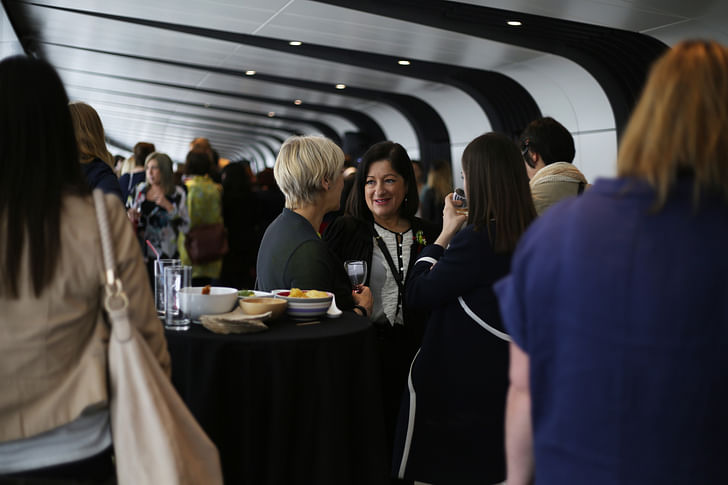
What were the reasons for starting up Chicks with Bricks?
I started Chicks with Bricks when I was 23. It was a very personal thing at the time, I couldn’t find anyone that I wanted to “be” in the industry. I was working for KPF, I’d just come out of the Royal College of Art, I was working in New York, came back to London, decided I wanted my career in London, and just out of interest I was Googling around, trying to find people of interest that I could talk to as mentors. I found some amazing people that I had as mentors, and still do, but I wanted a balance of women that could do it too. And as I looked I found that there were quite a lot of amazing women out there, but there just wasn’t that much press. I thought, “Well if I want to meet these women then I’m sure there are others that want to meet these women too,” so I went ahead and set something up.
It was about creating role models so that young women could come in and go “Oh yeah, that woman is amazing, I can talk to her about this, she can give me advice,” and giving them space where they can all meet.We’re not focusing on problems, we’re focusing on solutions, the best way to do that is to focus on someone who’s done it
Who do you attract? Are Chick with Bricks mixed events?
I'd say it's pretty wide-ranging, I think we have about 3,800 women that are in our database at the moment and we tend to get between 200 to 400 people attending our events.
I was interested in creating something that was about the wider construction industry, not just focused on architects and consultants. 12% of the industry is female, but if you actually drill into that only 4% are trained professionals, the others are in support roles, so that meant going out and to clients, to women in manual trade, to the whole range of different people apart from the consultants that we all tend to hang out with—lawyers, planners, all of those people—so we’ve created quite an inclusive network.
We invert the percentage of men at our events, so we actually have 12% men and the rest are women. The idea is that we always reflect the percentage that is in the industry at present, and my view is that if we get to 50/50 then we’ve made it, and we’ll probably stop running it.
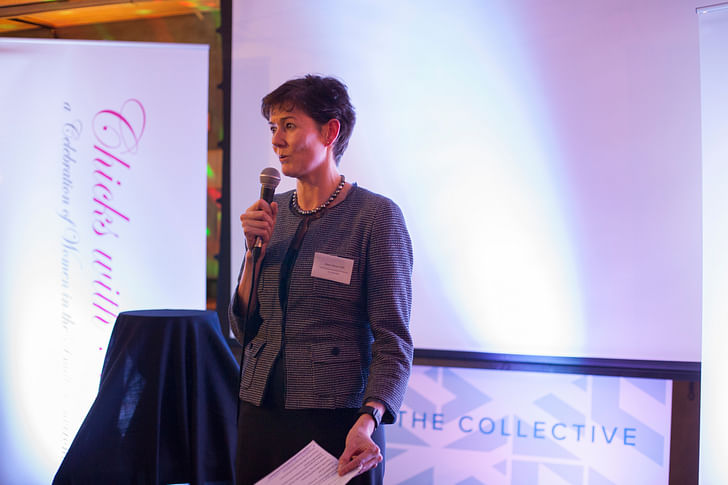
What is it like to attend Chick with Bricks events?
It’s an upbeat event, it's not about moping about. It’s not about moaning about what’s wrong with the industry, it’s purely about supporting and promoting success, which is one of my founding values. Focus on the things that are really good, because for young women coming into the industry, that’s what they want to see. Positivity is what drives women; it's not discontentment, its support and positivity, which is, perhaps, a subtle difference between how men and women operate, although it's bad to generalise.
We’re not focusing on problems, we’re focusing on solutions, the best way to do that is to focus on someone who’s done it and go, “Yep that’s great, I can learn from that.”
Has the construction industry changed for females in recent years?
In a nutshell, probably not so much. My view is—and it's the same from when I went into it—is that it’s great being a woman in architecture. It’s great being a woman in construction, but you are differentiated whether you like it or not, because you are just a lower percentage.
My view is that I’ve always been treated with respect, I’ve had absolutely no problems on building sites in my job at all. The two challenges you have as a woman and as an architect are having a child and low salaries. We don't earn enough money; we can’t afford childcare. You move out of London and you quit your job because it's so difficult.I think a lot of employers are very supportive. But it’s a 24/7 industry, it’s not an easy industry to be flexible in.
Do you make a difference as a female employer?
As an employer, and having had a child as well, I've gone through the process. I had two weeks off, my business was at a certain stage where I wanted to come to work and financially I could afford a full-time nanny, so it was possible for me, but I know the challenges because I've seen it with my friends and what happens if you can't afford that.
What are the wider issues here with equality?
I think that there is the wider issue, which is that the salaries that architects and consultants work on are just too low, and the gender pay gap. Women tend to be paid a lower salary.
What I keep saying at Chicks events is that you have to keep pushing, you have to ask for a pay rise, you have to be asked to be paid as much as a man does, you have to push as much as a man would push. When you have a child that extra £4 or £5k a year could make the difference between you not being stressed out and being able to come back into work and have a reasonably comfortable time. But I think one issue is having kids, and being able to afford the childcare, and be supported back into work. I think a lot of employers are very supportive. But it’s a 24/7 industry, it’s not an easy industry to be flexible in.
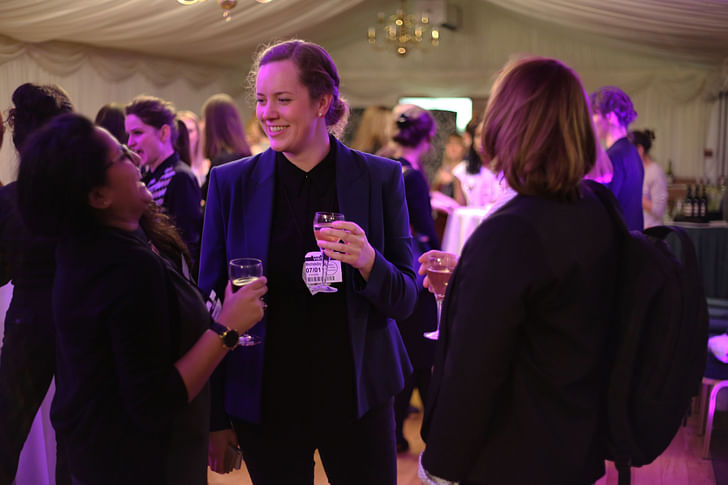
Apart from the cash and childcare, are there any other fundamental barriers?
The other issue for women is the perception of the industry. Do you want to be in an environment which is seen as ‘hairy arsed builders’ and surrounded by men all the time? A lot of women get put off by that.
It didn't put me off and I think also the big construction companies are very supportive now of encouraging a different persona of what it's like to be on a building site. The challenge isn’t the bigger companies, it’s the smaller ones in construction. Some of the challenges are on the manual trade side with the smaller contractors.I’ve chosen a name that’s like Marmite. Most people really like it, they get it.
The current situation in London is bringing about the absolute rise of the mega-construction business. Do the big players set a positive agenda for equality?
The nature of the work now is that it's going to bigger contractors, it's more framework-based so the smaller contractors do tend to get pushed out. I think in some ways it's helping to systemise the smaller companies because they are having to go in under larger ones. Suppliers now have to work under the acts of government—big contractors are leading the way with this, they are setting the precedent of how people should behave and so I think it's got a lot better.
What does the name ‘Chicks with Bricks’ do for you?
I like the fact that I’ve chosen a name that’s like Marmite. Most people really like it, they get it. My view is that it is ironic, it is humorous. It’s alright to have humour, when you lose humour in an industry like this you are absolutely screwed, so you've got to be able to understand how women can be perceived in the industry and turn it on its head, without feeling afforded or upset about it, because it's certainly not an insult.
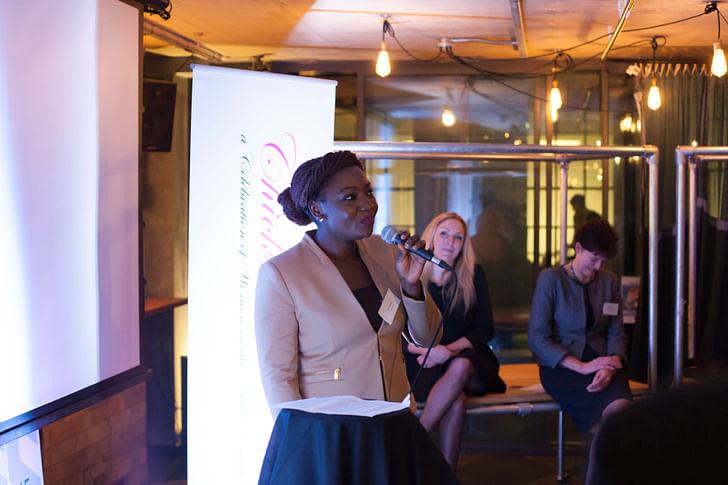
Do you ever find yourselves painted into a corner, politically?
We are not the Barbie dolls of the construction set, it’s not lipstick on a gorilla type stuff, but at the same time, it’s not man-bashing or an anti-establishment radicalised group. You can strike a line between the two. You can have women that are comfortable being feminine, comfortable not being as aggressive as some men can be in meetings, but also you can do your job really well and tow the line and succeed.
You don’t have to make a choice, it’s a big spectrum and I think women should have the choice about where they want to sit on that.
Any frustrations?
One of the things that I find frustrating about other women’s groups is how much infighting there can be. I’m supportive of anyone, in any field because it’s so bloody difficult to set something up, you should just think, “That’s great.” Some women’s groups that we’ve tried to engage with have been quite insular, and I find that quite distressing because you think surely in this industry everyone should be supporting each other, I try and support everyone. It’s about neutral support.clients just think architects don’t understand money, and a lot of architects think clients don’t understand design values.
Education. Can we accommodate for better equality in the future?
I wrote a chapter in a book for Harriet Harris in 2015, ["Education to Reboot a failed Profession"]. In the chapter that I co-authored, it was basically that education should be more about the realities of work, so you go to a model that isn’t just pie in the sky thinking, completely not in the real world of work.
I had seven years, Cambridge and the RCA, top universities, I literally came out and didn’t have the faintest idea about business, or how it would be to work in an architectural practice, and I think after seven years that’s pretty sloppy.
Cambridge was very rigorous in some ways but the realities of the world that you work and live in just aren’t taught, and I think that’s a massive failure because that’s the reason why architects and consultants don’t get more money, it’s because they don’t understand how to ask for it and they don’t understand the business side. Because architects don’t understand how buildings get procured and paid for, they don’t understand how to ask for enough money. This breeds a problem between clients and architects because clients just think architects don’t understand money, and a lot of architects think clients don’t understand design values.
There isn’t enough business training in architecture on how you deliver projects, so much of it is project management and managing people.
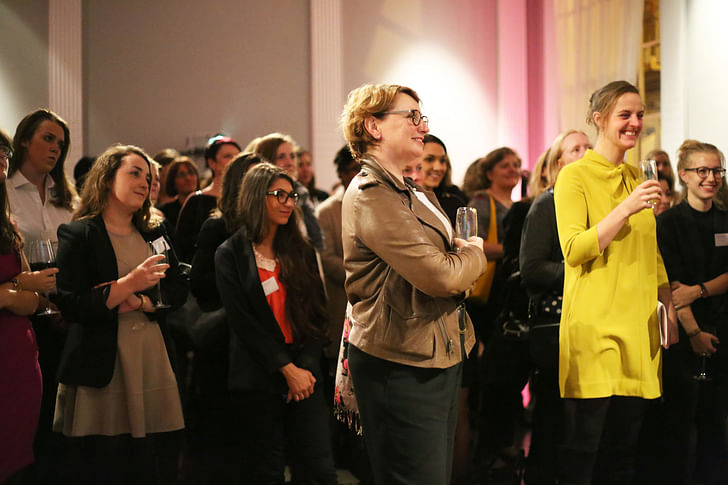
Final thoughts?
For women coming into this industry, you’ve got to be tenacious, you’ve got to be tough, you’ve got to be prepared to stick your head above the parapet and take risks. You have to be confident in being yourself. I guess it’s like being a lawyer and the pressure to be a ball-breaking bitch, you feel like you can’t be feminine and tough at the same time. You don’t have to be one or the other.
This interview is part of Archinect's special May 2016 theme, Help. How can architecture create more equitable societies? Our open call for humanitarian design work ends May 22 — click here to submit.
Robert studied fine art and then worked in children's television as a sound designer before running an art gallery and having a lot of fun. After deciding that writing was the overruling influence he worked as a copywriter in viral advertising and worked behind the scenes for branding and design ...
1 Comment
"[Y]ou’ve got to be prepared to stick your head above the parapet and take risks."
Love this quote along with all the insights in this interview. More of this please!
Block this user
Are you sure you want to block this user and hide all related comments throughout the site?
Archinect
This is your first comment on Archinect. Your comment will be visible once approved.